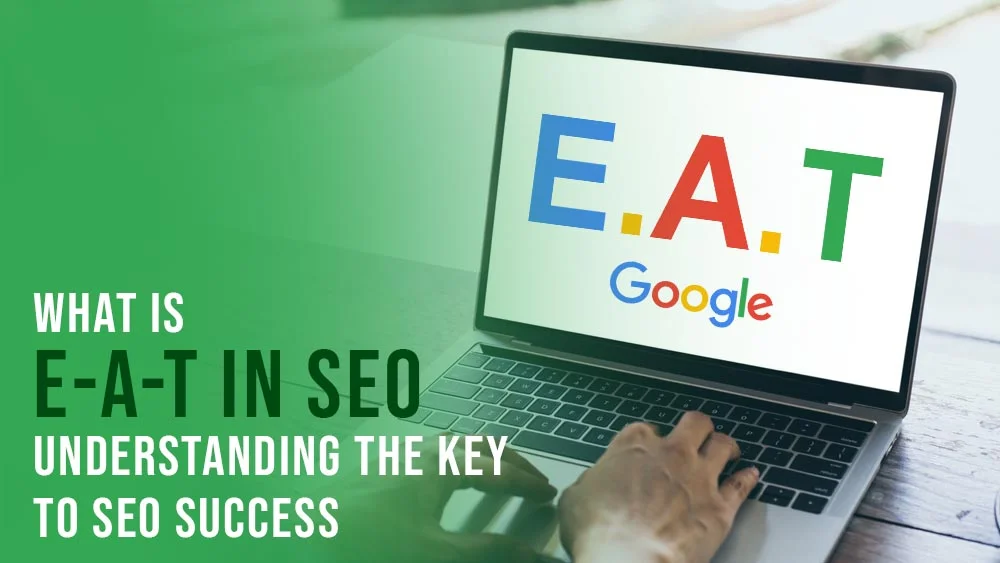What Is E-A-T In SEO: Understanding The Key to SEO Success
What Is E-A-T In SEO: Understanding The Key to SEO Success
In 2018, the whole E-A-T concept started to arise. With a lot of people talking about it, the curiosity of some got the best of them. That is why we decided to dedicate a whole blog article to addressing this little SEO factor. In the realm of search engine optimization (SEO), the letters E-A-T play an important part in deciding the level of success that a website will have.
E.A.T. is an abbreviation that stands for "Expertise, Authoritativeness, and Trustworthiness," and it refers to a collection of characteristics that search engines employ to assess the quality and dependability of the material on a website. In this article, we will discuss what E.A.T. is, why it is significant, and offer suggestions on how to improve it in order to achieve better results with SEO.
What is E-A-T in SEO, and Why Is It Important?

The acronym E.A.T., which stands for Expertise, Authoritativeness, and Trustworthiness, is an essential component of successful search engine optimization. E-A-T is a three-part ranking system that helps search engines like Google determine the credibility and usefulness of a website's content. The term "authoritativeness" refers to the website's or author's reputation as well as their level of authority in the field. "Expertise" refers to the knowledge and expertise of the content provider or website. The reliability and credibility of the information that is presented are directly related to a person's level of trustworthiness.
E-A-T is vital for SEO because search engines aim to present users with the information that is most relevant to their needs and that they can trust. High levels of expertise, authority, and trustworthiness on a website increase the likelihood that it will appear higher in search engine results. These qualities can be demonstrated using a variety of metrics. Increasing your E-A-T entails producing material that is of a high quality, is correct, and can be relied upon, establishing a good reputation and being seen as an authority in your specific field, and developing trust with your audience by being transparent and credible. You may boost the effectiveness of your website's SEO and draw more organic traffic to it by concentrating on the letters E, A, and T.
How to Establish “Expertise” in Your Content
Establishing expertise in your content is essential for improving your website's E-A-T and boosting your SEO success. Here are the main five strategies to help you establish expertise:
- Research and understand your niche: Take the time to thoroughly research and understand your niche. Keep up of the most recent market trends, news, and developments. This will help you create content that demonstrates your knowledge and expertise.
- Provide valuable and informative content: Create content that provides value to your audience. Offer in-depth information, insights, and practical tips that showcase your expertise. This will not only attract and engage your audience but also establish you as a trusted source of information.
- Showcase your credentials and experience: Highlight your credentials, qualifications, and experience in your content. This could include mentioning relevant degrees, certifications, awards, or professional affiliations. With your audience, this will assist establish credibility and trust.
- Use data and evidence: Back up your claims and statements with data, research, and evidence. This will further establish your expertise and make your content more trustworthy and reliable.
- Collaborate with other experts: Collaborating with other experts in your field can help boost your credibility and authority. Consider featuring guest posts, interviews, or collaborations with industry leaders or influencers. This will not only provide valuable insights but also enhance your reputation.
Extra Tips on How to Establish “Expertise” in Your Content
- Get your audience involved: Answer the audience's queries, comments, and suggestions. This shows that you are actively engaged and knowledgeable in your field. It also helps build a sense of trust and community with your audience.
- Continuously learn and improve: Stay curious and committed to learning and improving your knowledge and skills. Attend industry conferences, workshops, and webinars. Read books, articles, and research papers. This ongoing learning will help you stay at the forefront of your field and maintain your expertise.
By implementing these tips and along with the strategies above, you can establish expertise in your content and improve your website's E-A-T. This will not only boost your SEO success but also attract a loyal and engaged audience.
Building Authoritativeness Through Backlinks and Social Proof

Building authoritativeness is a crucial aspect of improving your website's E-A-T and boosting your SEO success. Creating authoritativeness through backlinks is one efficient method. Backlinks are links from other websites that lead to your website. When reputable and authoritative websites link to your content, it signals to search engines that your website is trustworthy and credible.
To build backlinks, you can reach out to other websites in your industry and offer to contribute guest posts or collaborate on content. This not only helps you gain valuable backlinks but also exposes your content to a wider audience. Additionally, you can create high-quality, shareable content that naturally attracts backlinks from other websites.
Social proof is another important factor in building authoritativeness. Social proof refers to the validation and recognition of your expertise and authority by others. This can be achieved through testimonials, reviews, case studies, and endorsements from satisfied customers or industry experts. Displaying social proof on your website helps build trust and credibility with your audience.
In conclusion, building authoritativeness through backlinks and social proof is essential for improving your website's E-A-T and boosting your SEO success. By implementing these strategies, you can establish yourself as an authoritative source in your industry and attract a loyal and engaged audience.
Gaining Trustworthiness With Transparency and User Reviews
Transparency and user reviews are key elements in gaining trustworthiness and improving your website's E-A-T. Transparency involves being open and honest about your business practices, including disclosing any potential conflicts of interest or affiliations. This helps build trust with your audience and shows that you are committed to providing accurate and reliable information.
User reviews are another important aspect of building trustworthiness. Positive reviews from satisfied customers can help establish your credibility and expertise. Encourage your customers to leave reviews on platforms such as Google My Business, Yelp, or industry-specific review sites. Responding to both positive and negative reviews in a professional and timely manner shows that you value feedback and are committed to providing a positive user experience.
In addition to transparency and user reviews, it's important to regularly update and maintain your website's content. Outdated or inaccurate information can harm your credibility and trustworthiness. Regularly review and update your content to ensure it reflects the most current and accurate information in your industry.
By prioritizing transparency, user reviews, and up-to-date content, you can enhance your website's trustworthiness and improve your overall SEO success.
What Is E-A-T in SEO: It’s Role in Google’s Search Algorithm
E-A-T, or Expertise, Authoritativeness, and Trustworthiness, plays a significant role in Google's search algorithm. Google wants to give people the most accurate and reliable information possible.. That is why people tend to use it as their main search engine, and E-A-T helps determine the credibility and reliability of a certain website.
Expertise refers to the knowledge and expertise of the content creators or web authors. Google wants to ensure that the information provided is accurate and reliable, so it looks for websites that have content created by experts in the field.
Authoritativeness refers to the authority and reputation of the website or brand. Google considers factors such as the number of high-quality backlinks, mentions from reputable sources, and the overall reputation of the website or brand.
Trustworthiness is crucial for Google, as it wants to provide users with trustworthy information. Factors such as transparency, user reviews, and accurate and up-to-date content contribute to the trustworthiness of a website.
To improve your website's E-A-T and enhance your SEO success, focus on creating high-quality, accurate, and reliable content. Establish yourself or your brand as an authority in your industry by showcasing your expertise and building a strong reputation. Encourage user reviews and respond to them in a professional and timely manner. Regularly update and maintain your website's content to ensure it reflects the most current and accurate information. By prioritizing E-A-T, you can improve your website's visibility in Google's search results and attract more organic traffic.
Final Thoughts
You should attempt to improve your E-A-T scores because it's crucial for SEO. This can be done in two steps.
- Be credible.
- Hire specialists.
Remember that Google does not owe you a living if that sounds infuriating. Just because you have a website doesn't mean you should automatically rank. Also remember that link exchange enhances your SEO and helps you have a higher domain authority when you implement it in the right way. One of the main solutions that we have for you today is our link swapping platform. With our new domain, you can swap links easily and exchange them with various other networks, domains, or platforms. Sign up now, it's easy, efficient, and free!

Comments
Post a Comment